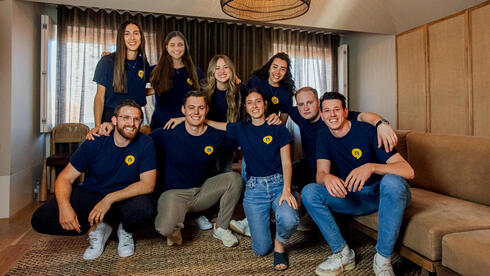Nagish raises $11 million in Series A to make communications accessible to the deaf CTech
Israeli startup Nagish, which enables deaf people to talk on the phone using artificial intelligence, has raised $11 million in a Series A funding round. The fundraising was led by Canaan Partners, and existing investors K5 Global, Tokyo Black, Cardumen Capital, Vertex Ventures Israel, Contour Venture Partners and Precursor Ventures also participated, along with the founders of Datadog and Looker. The company has raised $16 million so far. The funding will allow Nagish, which means accessible in Hebrew, to develop its communication solutions designed to enhance the communication, information sharing and work capabilities of more than one billion deaf and hard of hearing people worldwide. are designed to continue.
To date, people with hearing and speech impairments who want to talk on the phone must contact a telephone relay service provider, where center staff join the conversation and help translate text into voice and vice versa. Nagish created a private relay service that allows deaf and hard of hearing people to communicate over the phone without the need for a human intermediary. This solution enables real-time transcription, text display customization based on user needs, and an intuitive interface. “At Nagish, we are aware of, but not afraid of, the disruption caused by generative AI that will make simultaneous transcription and translation into mainstream products available to everyone. Today, it may seem like the only thing We do, but in practice, explains Tomer Aharoni, CEO of this company, we are an access company and our solutions are much broader and transcription is only one part of it.
Nagish software is currently integrated into the communication solutions of the American giant Comcast, and its customers include Amazon. Aharoni explains that many employees in Amazon’s logistics centers are deaf and need access solutions to communicate with other employees. He also notes that Nagish was recently added to the list of providers authorized by the US Federal Communications Commission (FCC) to offer automated simultaneous translation services, alongside five older companies that use human translators. After this inclusion, the Israeli company will receive a fee for every minute of calls made through its app. According to Aharoni, the U.S. alone has a $2 billion market because sign language interpreters or simultaneous deaf interpreters charge $75 an hour, and because the job is intensive, each interpreter can only work a few hours. Therefore, if a company wants to hire a deaf employee, it often has to hire two sign language interpreters at the same time, which in most cases makes the employment unprofitable.
Worldwide, there are about one billion people with hearing loss, of which 800,000 are in Israel. All deaf and hard of hearing people do not have hearing aids, sometimes for medical reasons and sometimes because of the high costs of the devices. Additionally, most deaf people do not speak and therefore require access services. Aharoni explains that many other countries, including Canada, Japan and Australia, have government programs to encourage the integration of deaf people into the labor market, and Nagish plans to expand there as well.
The company started as a hobby for Aharoni (32) and his co-founder Alon Iser (31), both graduates of the School of Computer Science at Columbia University in the United States. Aharoni, who specializes in natural language processing (NLP), began developing an automatic translation and transcription engine for the deaf in 2019, but the project accelerated in 2020 following the coronavirus pandemic. Many deaf people were unable to communicate during the quarantine, and the Israeli company’s accessibility program began to accumulate downloads at a rapid pace. The two received an initial request from Comcast to develop a solution that would allow deaf people to communicate using software such as Zoom. Today, Nagish employs 18 people, most of them in the United States, where Aharoni and Yzer are also based, but it plans to expand into Israel, reaching 30 employees by the end of the third quarter.
#Nagish #raises #million #Series #communications #accessible #deaf #CTech
